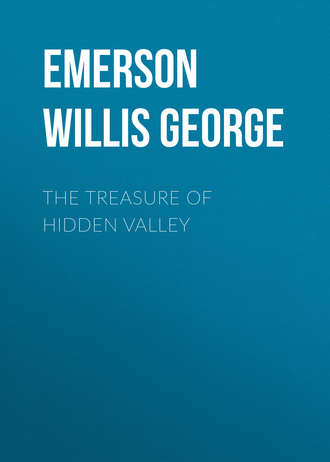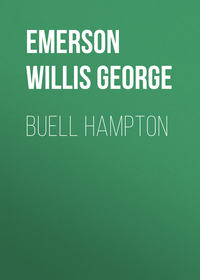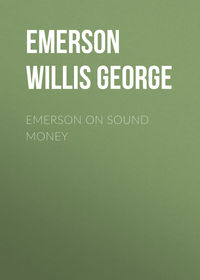 полная версия
полная версияThe Treasure of Hidden Valley
“Go ahead,” smiled Roderick. He had already recovered his self-possession. “But you haven’t informed me yet how you come to know Ben Bragdon, our cleverest young lawyer here, I’ve been told, and likely enough to get the Republican nomination for state senator.”
“Oh, simple enough. I’ve come up to investigate one technical point in regard to those smelter bonds. Well, Ben Bragdon, your political big gun, happens to be your uncle’s legal adviser in Wyoming.”
“Which reminds me,” interposed Roderick earnestly, “that you are not to give away my whereabout, Whitley – just yet.”
“A bit rough on the old uncle not to tell him where you are – or at least let him know that you are safe and well. He loves you dearly, Rod, my boy.”
“And I love him – yes, I’ll admit it, I love him dearly, and Aunt Lois too. But this is a matter of personal pride, Whitley. You spoke a moment ago of Uncle Allen’s personal pride. Well, I’ve got mine too, and that day of my last visit to Keokuk, when he told me that not one dollar of his fortune would ever be mine unless I agreed to certain abominable conditions he chose to lay down, I on my side resolved that I would show him I could win a fortune from the world by my own unaided efforts. And that’s what I’m going to do, Whitley; make no mistake. I don’t want him to butt in and interfere in any way. I am going to play this game absolutely alone, and luckily my name gives no clue to the lawyer Ben Bragdon or anyone else here of my relationship with the rich banker of Keokuk, Allen Miller.”
“Of course, Rod, whatever you say goes. But all the same there can be no harm in my relieving your uncle’s mind by at least telling him that I’ve heard from you – that you are in good health, and all that sort of thing. But you bet I won’t let out where you are or what you are doing. Oh, I’ll go up in the old chap’s estimation by holding on tight to such a secret. To be absolutely immovable when it would be a breach of confidence to be otherwise is part of a successful young banker’s moral make-up, you understand.”
Roderick laughed, his obduracy broken down by the other’s gay insistence.
“All right, old fellow, we’ll let it go at that But as to my being in Wyoming, remember dead secrecy’s the word. Shake hands on that; my faith in such a talented and discreet young banker is implicit. But now we must join the others or they’ll be thinking us rather rude.”
“That – or the dear girls may be fretting out their hearts on my account. A rich young banker from Iowa doesn’t blow into Encampment every day, you know.” And Whitley Adams laughed with all the buoyant pride of youth, good looks, good health, and good spirits. “Come along, dear boy,” he went on, linking his hand in Roderick’s arm. “We’ll find Lawyer Bragdon, get our introductions, and start fair with the beauteous chatelaine of the cattle range.”
Roderick had heard about Ben Bragdon from Grant Jones, but had not as yet happened to meet the brilliant young attorney who was fast becoming a political factor in the state of Wyoming. So it fell to the chance visitor to the town, Whitley Adams, to make these two townsmen acquainted. Bragdon shook Roderick’s hand with all the cordiality and geniality of a born “mixer” and far-seeing politician. But Whitley cut out all talk and unblushingly demanded that he and his friend should be presented without further delay to General Holden’s daughter.
They found her in company with Barbara Shields who, her duties of receiving over, was now mingling with her guests.
“Miss Holden, let me present you to Mr. Roderick Warfield.” The introducer was Ben Bragdon.
“One of papa’s favorite boys,” added Barbara kindly, “and one of our best riders on the range.”
“As I happen to know,” said Gail Holden; and with a frank smile of recognition she extended her hand. “We have already met in the hills.”
Roderick was blushing. “Yes,” he laughed nervously. “I was stupid enough to offer to help you with a young steer. But I didn’t know then I was addressing such a famous horsewoman and expert with the lariat.”
Gail Holden smiled, pleasedly but composedly. She possessed that peculiar modesty of dignified reserve which challenges the respect of men.
“Oh, you would have no doubt done a great deal better than I did,” she replied graciously.
But Whitley Adams had administered a kick to Roderick’s heel, and was now pushing him aside with a muttered: “You never told me you had this flying start, you cunning dog. But it’s my turn now.” And he placed himself before Miss Holden, and was duly presented by Bragdon.
A moment later Whitley was engaging Gail in a sprightly conversation. Roderick turned to Barbara, only to find her appropriated by Ben Bragdon. And Barbara seemed mightily pleased with the young lawyer’s attentions – she was smiling, and her eyes were sparkling, as she listened to some anecdote he was telling. Roderick began to feel kind of lonesome. If there was going to be anyone “shot full of holes” because of attentions to the fair Miss Barbara, he was evidently not the man. He had said to Grant Jones that any association of his name with hers was “rank foolishness,” and humbly felt now the absolute truthfulness of the remark. He began to look around for Grant – he felt he was no ladies’ man, that he was out of his element in such a gathering. There were many strange faces; he knew only a few of those present.
But his roving glance again lighted and lingered on Gail Holden. Yes, she was beautiful, indeed, both in features and in figure. Tall, willowy, stately, obviously an athlete, with a North of Ireland suggestion in her dark fluffy hair and sapphire blue eyes and pink-rose cheeks. He had seen her riding the range, a study in brown serge with a big sombrero on her head, and he saw her now in the daintiest of evening costumes, a deep collar of old lace around her fair rounded neck, a few sprigs of lily of the valley in her corsage, a filigree silver buckle at the belt that embraced her lissom form. And as he gazed on this beauty of the hills, this splendid type of womanhood, there came back to him in memory the wistful little face – yes, by comparison the somewhat worn and faded face – of the “college widow” to whom his troth was plighted, for whom he had been fighting and was fighting now the battle of life, the prize of true love he was going to take back proudly to Uncle Allen Miller along with the fortune he was to win with his own brain and hands.
“By gad, it’s more than three weeks since Stella wrote to me,” he said to himself, angrily. Somehow he was glad to feel angry – relieved in mind to find even a meagre pitiful excuse for the disloyal comparison that had forced itself upon his mind.
But at this moment the music struck up, there was a general movement, and he found himself next to Dorothy Shields. Whitley had already sailed away with Miss Holden.
“Where is Grant?” asked Roderick.
“Not yet arrived,” replied Dorothy. “He warned me that he would be late.”
“Then perhaps I may have the privilege of the first waltz, as his best friend.”
“Or for your own sake,” she laughed, as she placed her hand on his shoulder.
Soon they were in the mazy whirl. When the dance was ended Dorothy, taking his arm, indicated that she wished him to meet some people in another part of the room. After one or two introductions to young ladies, she turned to a rather heavy set, affable-looking gentleman and said: “Mr. Warfield, permit me to introduce you to Mr. Carlisle – Mr. Carlisle, Mr. Warfield.”
The men shook hands and looked into each other’s eyes. Roderick remembered this was the attorney of the smelting plant, and Carlisle remembered this was the young gentleman of whom the Shields sisters had so often spoken in complimentary terms. W. Henry Carlisle was a man perhaps forty years old. He was not only learned in the law, but one could not talk with him long without knowing he was purposeful and determined and in any sort of a contest worthy of his foeman’s steel.
Later Roderick danced with Barbara, and when he had handed her over to the next claimant on her card was again accosted by Ben Bragdon. He had liked the young attorney from the first, and together they retired for a cigarette in the smoking room.
“I saw you were introduced to that fellow Carlisle,” began Bragdon.
“Yes,” replied Roderick, smiling, for he already knew of the professional feud between the two men.
“Well, let me say something to you,” Bragdon continued. “You look to me like a man that is worth while, and I take the opportunity of telling you to let him alone. Carlisle is no good. Outside of law business and the law courts I would not speak to him if he were the last man on earth.”
“Why,” said Roderick, “you are pronounced in your views to say the least.”
Bragdon turned to Roderick and for a moment was silent. Then he asked: “What are you, a Republican or a Democrat?”
“Why, I am a Republican.”
“Shake,” said Bragdon, and they clasped hands without Roderick hardly understanding why. “Let me tell you something else,” Bragdon went on. “Carlisle claims to be a Republican but I believe he is a Democrat. He don’t look like a Republican to me. He looks like a regular secessionist Democrat and there is going to be a contest this fall for the nomination for state senator. W B. Grady and the whole smelting outfit are going to back this man Carlisle and I am going to beat him. And say – old man – ” he smiled at Roderick when he said this and slapped him on the shoulder familiarly – “I want you on my side.”
“Well,” said Roderick, half embarrassed and hesitatingly, “I guess I am getting into politics pretty lively among other things. I don’t see at this moment why I should not be on your side.”
“Well, come and see me at my office over at Encampment and we will talk this matter over.” And so it was agreed.
Just then they heard singing, so they threw their cigarettes away and went back to the ballroom. A quartet of voices accompanied on the piano by Gail Holden were giving a selection from the Bohemian Girl. Whitley Adams was hovering near Miss Holden, and insisted on turning the music At the close of the number Whitley requested that Mr. Warfield should sing. Everyone joined in the invitation; it was a surprise to his western friends that he was musical. Reluctantly Roderick complied, and proving himself possessed of a splendid baritone voice, delighted everyone by singing “Forgotten” and one or two other old-time melodies. Among many others, Dorothy, Barbara, and Grant Jones, who had now put in an appearance, overwhelmed him with congratulations. Gail Holden, too, who had been his accompanist, quietly but none the less warmly, complimented him.
Then Gail herself was prevailed upon to sing. As she resumed her seat at the piano, she glanced at Roderick.
“Do you know ‘The Rosary’.” she asked in a low voice unheard by the others.
“One of my favorites,” he answered.
“Then will you help me with a second?” she added, as she spread open the sheet of music.
“I’ll be honored,” he responded, taking his place by her side.
Her rich contralto voice swelled forth like the sweeping fullness of a distant church organ, and Roderick softly and sweetly blended his tones with hers. Under the player’s magic touch the piano with its deep resonant chords added to the perfect harmony of the two voices. The interpretation was wonderful; the listeners were spellbound, and there followed an interval of tense stillness after the last whispered notes had died away.
As Gail rose and stood before him, she looked into Roderick’s eyes. Her cheeks were flushed, she was enveloped in the mystery of song, carried away by music’s subtle power. Roderick too was exalted.
“Superb,” he murmured ecstatically.
“Thanks to you,” she replied in a low voice and with a little bow.
Then the buzz of congratulations was all around them. During that brief moment, even in the crowded ballroom they had been alone – soul had spoken to soul. But now the tension was relaxed. Gail was laughing merrily. Whitley Adams was punching Roderick in the ribs.
“Say, old man, that’s taking another mean advantage.”
“What do you mean?” asked Roderick, recovering his composure.
“Singing duets like that isn’t toeing the line. The start was to be a fair one, but you’re laps ahead already.” Whitley was looking with comical dolefulness in the direction of Gail Holden.
“Oh, I catch your drift,” laughed Roderick. “Well, you brought the trouble on yourself, my boy. It was you who gave me away by declaring I could sing.”
“Which shows the folly of paying a false compliment,” retorted Whitley. “However, I’m going to get another dance anyhow.”
He made a step toward Gail, but Roderick laid a detaining hand on his shoulder.
“Not just yet; the next is mine.” And with audacity that amazed himself Roderick advanced to Gail, bowed, and offered his arm. The soft strains of a dreamy waltz had just begun.
Without a word she accepted his invitation, and together they floated away among the maze of dancers.
“Well, that’s going some,” murmured Whitley, as he glanced around in quest of consolation. Dorothy Shields appeared to be monopolized by Grant Jones, but the two lawyers, Eragdon and Carlisle, were glowering at each other, as if in defiance as to which should carry off Barbara. So Whitley solved the problem by sailing in and appropriating her for himself. He was happy, she seemed pleased, and the rivals, turning away from each other, had the cold consolation that neither had profited by the other’s momentary hesitation.
After the first few rounds Roderick opened a conversation with his partner. He felicitated her upon her playing and singing. She thanked him and said: “Most heartily can I return the compliment.” He bowed his acknowledgment.
“You must come to Conchshell ranch and call on my father. He will be glad to meet you – has been an invalid all the winter, but I’m thankful he is better now.”
“I’ll be honored and delighted to make his acquaintance,” replied Roderick.
“Then perhaps we can have some more singing together,” she went on.
“Which will be a great pleasure to me,” he interjected fervently.
“And to me,” she said, smiling.
Whether listening or speaking there was something infinitely charming about Gail Holden. When conversing her beautiful teeth reminded one of a cupid’s mouth full of pearls.
“It has been some time,” explained Roderick, “since I was over your way.”
For a moment their eyes met and she mischievously replied;
“Oh, yes. Next time, I’ll not only sing for you, but if you wish I will teach you how to throw the lariat.”
“I don’t presume,” replied Roderick banteringly, “you will guarantee what I might catch even if I turned out to be an expert?”
“That,” Gail quickly rejoined, “rests entirely with your own cleverness.”
Just then it was announced from the dining room that the tables with the evening collation were spread, and as Roderick was about to offer his arm to Miss Holden, Barbara came hurriedly up, flushed and saying: “Oh, Gail, here is Mr. Carlisle who wants to take you to supper. And Mr. Warfield, you are to escort me.” She smiled triumphantly up into his face as she took his arm.
As they walked away together and Barbara was vivaciously talking to him, he wondered what it all meant Everybody seemed to be playing at cross purposes. Again he thought of the letter of warning pushed under Grant Jones’ door and mentally speculated how it would all end.
CHAPTER XV – BRONCHO-BUSTING
IT WAS the morning following the big entertainment at the Shields ranch when Roderick and two other cowboy companions began the work of breaking some outlaw horses to the saddle. The corral where they were confined was a quarter of a mile away from the bunk house.
Grant Jones had remained overnight, ostensibly to pay Roderick a visit during the succeeding day. He was still sound asleep when Roderick arose at an early hour and started for the corral. Whitley Adams had also been detained at the ranch house as a guest. He had invited himself to the broncho-busting spectacle, and was waiting on the veranda for Roderick as the latter strolled by.
An unbroken horse may or may not be an outlaw. If he takes kindly to the bridle and saddle and, after the first flush of scared excitement is over with, settles down and becomes bridle-wise then he is not an outlaw. On the other hand when put to the test if he begins to rear up – thump down on his forefeet – buck and twist like a corkscrew and continues jumping sideways and up and down, bucking and rearing until possibly he falls over backward, endangering the life of his rider and continues in this ungovernable fashion until finally he is given up as unbreakable, why, then the horse is an outlaw. He feels that he has conquered man, and the next attempt to break him to the saddle will be fraught with still greater viciousness.
Bull-dogging a wild Texas steer is nothing compared with the skill necessary to conquer an outlaw pony.
Nearly all cowboy riders, take to broncho-busting naturally and good-naturedly, and they usually find an especial delight in assuring the Easterner that they have never found anything that wears hair they cannot ride. Of course, this is more or less of a cowboy expression and possibly borders on vanity. However, as a class, they are not usually inclined to boast.
Very excellent progress had been made in the work of breaking the bronchos to the saddle. It was along about eleven o’clock when Roderick had just made his last mount upon what seemed to be one of the most docile ponies in the corral. He was a three-year-old and had been given the name of Firefly. The wranglers or helpers had no sooner loosened the blindfold than Roderick realized he was on the hurricane deck of a pony that would probably give him trouble. When Firefly felt the weight of Roderick upon his back, apparently he was stunned to such an extent that he was filled with indecision as to what he should do and began trembling and settling as if he might go to his knees. Roderick touched his flank with a sharp spur and then, with all the suddenness of a flash of lightning from a clear sky, rider and horse became the agitated center of a whirling cloud of dust. The horse seemingly would stop just long enough in his corkscrew whirls to jump high in the air and light on his forefeet with his head nearly on the ground and then with instantaneous quickness rear almost upright Whitley Adams was terribly scared at the scene. The struggle lasted perhaps a couple of minutes, and then Roderick was whirled over the head of the pony and with a shrill neigh Firefly dashed across the corral and leaping broke through a six foot fence and galloped away over the open prairie. The two wranglers and Whitley hastened to Roderick’s side. He had been stunned but only temporarily and not seriously injured, as it proved.
“Oh, that’s all right,” he said presently as he rubbed his eyes.
“Are you hurt?” Whitley inquired. Roderick slowly rose to his feet with Whitley’s assistance and stretching himself looked about as if a bit dazed. “No, no,” he replied, “I am not hurt but that infernal horse has my riding saddle.”
“You had better learn to ride a rocking horse before trying to ride an outlaw, Warfield,” said Scotty Meisch, one of the new cowpunchers, sneeringly.
Roderick whirled on him. “I’ll take you on for a contest most any day, if you think you are so good and I am so poor as all that,” he said. “Come on, what do you say?”
“Well, I ride in the Frontier Day’s celebration that comes on in July at our local fair,” the cowboy said. “Guess if you want to ride in a real contest with me you’d better enter your name and we’ll see how long you last.”
“Very well, I’ll just do that for once and show you a little something about real roughriding,” said Roderick; “and Firefly will be one of the outlaws.”
Turning he limped off towards the bunk house with Whitley.
Whitley was greatly relieved that Roderick, although he had wrenched the tendons of his leg, had no broken bones. A couple of other cowboys mounted their ponies, and with lariats started off across the prairie to capture the outlaw and bring back the saddle. Whitley was assured that they were breaking horses all the time and now and then the boys got hold of an outlaw but no one was ever very seriously injured.
Reaching the lounging room of the bunk house, they learned that Grant was up and dressed. He had evidently gone up to the ranch house and at that very moment was doubtless basking in the smiles of Miss Dorothy.
The college chums, pipes alight, soon got to talking of old times.
“By the way,” remarked Whitley between puffs, “last month I was back at the class reunion at Galesburg and called on Stella Rain.”
Roderick reddened and Whitley went blandly on: “Mighty fine girl – I mean Stella. Finest college widow ever. I did not know you were the lucky dog, though?”
“What do you mean by my being the lucky dog?”
“Oh, you were always smitten in that quarter – everyone knew that. And now those tell-tale flushes on your face, together with what Stella said, makes it all clear. Congratulations, old man,” said Whitley, laughing good-naturedly at Roderick’s discomfiture.
As their hands met, Roderick said: “I don’t know, old chap, whether congratulations are in order or not. She don’t write as often as she used to. It don’t argue very well for me.”
“Man alive,” said Whitley, “what do you want with a college widow or a battalion of college widows when you are among such girls as you have out here? Great Scott, don’t you realize that these girls are the greatest ever? Grant Jones shows his good sense; he seems to have roped Miss Dorothy for sure. At first I thought I had your measure last night, when you were talking to Miss Barbara Shields – for the moment I had forgotten about Stella. Then you switched off and cut me out with the fair singer. Say, if somebody don’t capture Miss Gail Holden – ”
He paused, puffed awhile, then resumed meditatively: “Why, old man, down in Keokuk Gail Holden wouldn’t last a month. Someone would pick her up in a jiffy.”
“Provided,” said Roderick, and looked steadily at Whitley.
“Oh, yes, of course, provided he could win her.”
“These western girls, I judge,” said Roderick slowly – “understand I am not speaking from experience – are pretty hard to win. There is a freedom in the very atmosphere of the West that thrills a fellow’s nerves and suggests the widest sort of independence. And our range girls are pronouncedly independent, unless I have them sized up wrong. Tell me,” he continued, “how you feel about Miss Holden?”
“Oh,” replied Whitley, “I knew ahead that she was a stunning girl, and after that first waltz I felt withered all in a heap. But when I saw and heard you singing together at the piano, I realized what was bound to come. Oh, you needn’t blush so furiously. You’ve got to forget a certain party down at Galesburg. As for me, I’ve got to fly at humbler game. Guess I’ll have another look around.”
He laughed somewhat wistfully, as he rose and knocked the ashes from the bowl of his pipe.
Roderick had not interrupted; he was becoming accustomed to others deciding for him his matrimonial affairs. He was musing over the complications that seemed to be crowding into his life.
“You see I retire from the contest,” Whitley went on, his smile broadening, “and I hope you’ll recognize the devoted loyalty of a friend. But now those Shields girls – one or other of them – both are equally charming.”
“You can’t cut Grant Jones out,” interrupted Roderick firmly. “Remember, next to yourself, he’s my dearest friend.”
“Oh, well, there’s Miss Barbara left. Now don’t you think I would be quite irresistible as compared with either of those lawyer fellows?” He drew himself up admiringly.
“You might be liable to get your hide shot full of holes,” replied Roderick.
“What do you mean?”
But Roderick did not explain his enigmatic utterance.
“I think I’ll have a lay-down,” he said, “and rest my stiff bones.” He got up; he said nothing to Whitley, but the bruised leg pained him considerably.
“All right,” replied Whitley gaily. “Then I’ll do a little further reconnoitering up at the ranch house. So long.”
Warfield was glad to be alone. Apart from the pain he was suffering, he wanted to think things over. He was not blind to the truth that Gail Holden had brought a new interest into his life. Yet he was half saddened by the thought that almost a month had gone by without a letter from Stella Rain. Then Whitley’s coming had brought back memories of Uncle Allen, Aunt Lois, and the old days at Keokuk. He was feeling very homesick – utterly tired of the rough cow-punching existence he had been leading for over six months.





